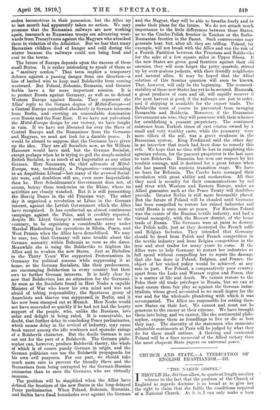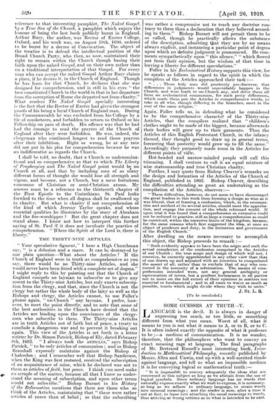CHURCH AND STATE.—A VINDICATION OF ENGLISH ERASTIANISM.—III.
" THE NAKED GOSPEL"
ISHOULD like, did time allow, to quote at length another witness to the fact that the position of the Church of England as regards doctrine is so broad as to give her the right to claim that she fulfils the conditions required of a National Church. As it is, I can only make a bare reference to that interesting pamphlet, The Naked Gospel, by a True Son of the Church, a pamphlet which enjoys the honour of being the last book publicly burnt in England. Arthur Bury, the author, was Rector of Exeter College, Oxford, and his work was, on August 19th, 1690, ordered to be burnt by a decree of Convocation. The object of the treatise is to defend the intellectual position of the Broad Church Party, who then, as now, maintained their right to remain within the Church though basing their faith upon the naked Gospel, and on their own rather than on a traditional interpretation of that Gospel. For every man who can accept the naked Gospel Arthur Bury claims a place, if he desires it, in the Church of England. Though he has fears for that Church, he declares that she was designed for comprehension, and is still in his eyes " the best constituted Church in the world in that in her departure from the corruption of Rome she departed not from charity." What renders The Naked Gospel specially interesting is the fact that the Rector of Exeter had given the strongest proofs of his being a loyal Church of England man. During the Commonwealth he was excluded from his College by a file of musketeers, and forbidden to return to Oxford or his Fellowship on pain of death. His offence was that he had had the courage to read the prayers of the Church of England after they were forbidden. He was, indeed, the clergyman who continued longest to read those prayers after their inhibition. Right or wrong, he at any rate did not put in his plea for comprehension because lie was an indifferentist as regards the Church.
I shall be told, no doubt, that a Church so undenomina- tional and so comprehensive as that to which The Liberty of Prophesying and The Naked Gospel point would b% no Church at all, and that by including men of so many different forms of thought she would lose all strength and vigour, and become, not a Church, but a mere fortuitous concourse of Christian or semi-Christian atoms. My answer must be a reference to the thirteenth chapter of the First Epistle to the Corinthians. St. Paul looks forwArd to the time when all dogma shall be swallowed up in charity. But what is charity if not comprehension of the kind of which Jeremy Taylor speaks, and whose essential qualities he illustrates by the story of Abraham and the fire-worshipper ? But the great chapter does not stand alone. I know not how to interpret this further saying of St. Paul if it does not inculcate the practice of
comprehension. )Vhere the Spirit of the Lord is, there is liberty."
THE THIRTY-NINE ARTICLES.
" Your speculative figment," I hear a High Churchman say, " is a delusion and a snare. It can be destroyed by one plain question—What about the Articles ? If the Church of England were in truth as comprehensive as you say, there would be no Thirty-nine Articles, and she would never have been fitted with a complete set of dogma." I might reply to this by pointing out that the Church of England compels no layman to subscribe or to give any assent to the Thirty-nine Articles, but only exacts subscrip- tion from the clergy, and that, since the Church is not the clergy but rather the whole body of the laity as well as the Bishops and clergy, the Articles cannot, to use Fuller's phrase again, " un-Church " any layman. I prefer, how- ever, to meet the point directly, and to note that some of the best authorities in the Church have denied that the Articles are binding upon the consciences of the clergy- men who subscribe to them. The Thirty-nine Articles are in truth Articles not of faith but of peace, a treaty to conclude a dangerous war and to prevent it breaking out again. This view of the Articles is set forth in a letter writter by Dr. Simon Patrick, Bishop of Ely, dated February 8th, 1682. " I always took the ARTICLES," says Bishop Patrick, " to be only articles of communion ; and so Bishop Bramhall expressly maintains against the Bishop of Chaleedon ; and I remember well that Bishop Sanderson, when the King was first restored, received the subscription of an acquaintance of mine, which he declared was not to them as articles of faith, but peace. I think you need make no scruple of the matter, because all that I know so under- stand the meaning of subscription, and upon other terms would not subscribe." Bishop Burnet in his History of the Reformation mentions that there are those who so think of the Articles, maintaining that " these were rather articles of peace than of belief ; so that the subscribing
was rather a compromise not to teach any doctrine con- trary to them than a declaration that they believed accord- ing to them." Bishop Burnet will not permit them to be so called, though he practically allows the substance of the description, admitting %bat they are by no means always explicit, and instancing a particular point of dogma upon which no definite judgment is pronounced. He com- ments sympathetically upon " this silence," " which 'flowed not from their opinion, but the wisdom of that time in leaving a liberty for different speculations."
Fuller in his Ecclesiastical History supports this view, for he speaks as follows in regard to the spirit in which the compilers of the Articles approached their task :- " . . . These holy men did prudently pm-discover, that differences in judgments would unavoidably happen in the Church, and were loath to um-Church any, and drive them off from an ecclesiastical communion, for such petty differences, which made them pen the Articles in comprehensive words, to take in all who, though differing in the branches, meet in the root of the same religion."
Again, Fuller tells us, in defending what he considered to be the comprehensive character of the Thirty-nine Articles, that the compilers realized that " children's clothes ought to be made of the biggest, because afterwards their bodies will grow up to their garments. Thus the Articles of this English Protestant Church, in the infancy thereof, they thought good to draw up in general terms, foreseeing that posterity would grow up to fill the same." Accordingly, they purposely made room in the Articles for different points of view.
Hot-headed and narrow-minded people will call this trimming. I shall venture to call it an equal mixture of wise statesmanship and true Christian charity. Further, I-may quote from Bishop Cleaver's remarks on the design and formation of the Articles of the Church of England, published in 1802. Bishop Cleaver, describing the difficulties attending so great an undertaking as the compilation of the Articles, observes:
"These difficulties, however, do not seem to have discouraged the great leaders in this work from forming a design as wise as it was liberal, that of framing a confession, which, in the enumera- tion and method of its several articles, should meet the approba- tion, and engage the consent of the whole reformed world. If upon trial it was found that a comprehension so extensive could not be reduced to practice, still as large a comprehension as could be contrived, within the narrower limits of the kingdom, became, for the same reasons which first suggested the idea, at once an object of prudence and duty, in the formation and government of the English Church."
After dwelling on the means necessary to accomplish this object, the Bishop proceeds to remark :-
" Such evidently appears to have been the origin and such the actual complexion of the confession comprised in the Articles of our Church ; the true scope and design of which will not, I conceive, be correctly apprehended in any other view than that of one drawn up and adjusted with an intention to comprehend the assent of all, rather than to exclude that of any who con- curred in the necessity of a reformation. The means of com- prehension intended were, not any general ambiguity or equivocation of terms, but a prudent forbearance in all parties not to insist on the full extent of their opinions in matters not essential or fundamental ; and in all cases to waive as much as possible, tenets which might divide where they wish to unite."
J. ST. L.S.
(To be concluded.)







































 Previous page
Previous page